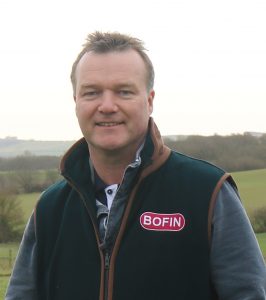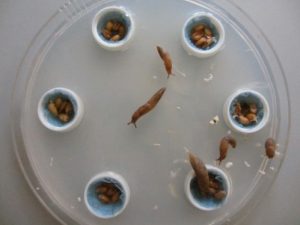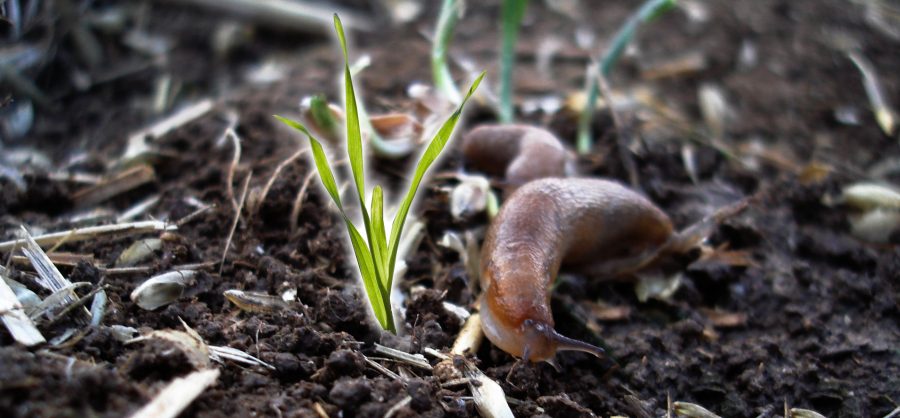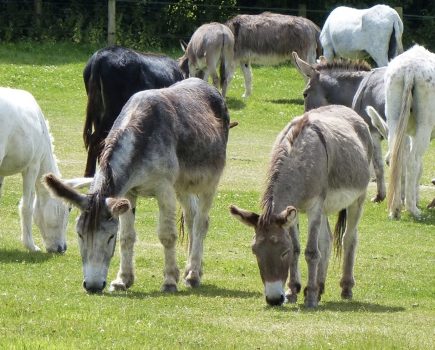A farmer-led research project exploring new ways to manage slug damage is seeking ‘Slug Scouts’ who will trap and send in slugs for feeding studies.
Farmers across the UK are being encouraged to capture grey field slugs and send them in to the John Innes Centre in Norwich for a ground-breaking scientific study taking place early this spring.
The scientists are hoping farmers will harvest around 1000 slugs from their fields. These will be used for feeding trials just getting underway at the John Innes Centre Insectary.
The project, led by the British On-Farm Innovation Network (BOFIN), aims to gauge how palatable a range of different wheats are to slugs, and help farmers move away from a reliance on chemical control measures and the potential environmental impact of those chemicals.
It follows initial studies that indicated one landrace wheat, known as Watkins 788, may be resistant to the slimy pests, that cost UK arable farmers £100M every year.

BOFIN founder, Tom Allen-Stevens
“Slugs are UK arable farming’s most damaging pest,” notes Oxfordshire farmer and BOFIN founder Tom Allen-Stevens, who co-ordinates farmer involvement in the project.
“As they get active again this month, rather than let them graze on our crops, we’re keen for farmers to join our group of ‘Slug Scouts’, who will trap the pests and send them in for this important study.”
The Slug Scout volunteers will be provided with a pack, including containers and postage-paid envelopes, as well as instructions on how to set up an effective ‘Slimery’.
“This is what you use to attract and trap your slug population that you can then harvest periodically – it’ll want to be in the most slug-infested spot of your farm,” explains Mr Allen-Stevens.
The trials are part of a wider project that aims to explore the palatability of wheat and the grazing behaviour of slugs, with the aim of identifying a possible slug-resistant trait for the development of future varieties.
Watkins 788 is one of a collection of landrace wheats currently being screened for interesting traits by scientists working on the Defra-funded Wheat Genetic Improvement Network (WGIN) programme.
“The initial feeding trials showed Watkins788 was consistently spurned by slugs,” explains Dr Simon Griffiths of John Innes Centre who leads the research.
“So we multiplied up enough of the variety for farmer-led trials that took place on farms across England over the autumn and winter.”
These were conducted by Slug Sleuths, 10 BOFIN farmers who followed an in-field trial protocol drawn up by slug behaviour expert Professor Keith Walters of Harper Adams University.
Results are currently being assessed and are due to be published next month at a webinar taking place on 16 March, 2023.
“The feeding trials will repeat the initial trials and then look in more detail at how slugs graze – whether it’s the Watkins seed or young shoots they tend to spurn, for example,” continues Dr Griffiths.
“We also now have 84 RILs (Recombinant Inbred Lines) of Watkins 788 crossed into Paragon, a more modern wheat, and we aim to screen these for palatability which should allow us to select more precisely for resistance.
“And there’s an elite line – a cross of KWS Santiago and Graham – that we believe may have a special quality. So we’re testing this in the feeding trials for the first time,” he adds.
The Slug-Resistant Wheat project is a farmer-led study that started in April 2022. Co-ordinated by BOFIN, anyone can join for free and get involved in the Slug Circle – a group of around 60 farmers and scientists who have come together to explore alternative forms of slug control and who have helped shape the project as it progresses.
“The field trials, that we intend to repeat this coming autumn, are essential to finding out whether there truly is a slug-resistant trait,” notes Mr Allen-Stevens.

Volunteer Slug Scouts are required to gather slugs from the field and send them in to Norwich’s John Innes Centre for lab-based feeding studies
“The lab-based feeding trials will inform what we put in the field and the urgency now is to collect enough slugs to explore thoroughly how they feed. So we’re really keen for farmers to volunteer as Slug Scouts, collect the slugs and send them in.
“But it’s not just about the trait – we have learned so much already that the Slug Sleuths will be sharing with members of the Slug Circle over the coming months.
“We want this farmer-led voyage of knowledge discovery to help build a more resilient and sustainable approach to managing slugs in future that moves away from our current over-reliance on chemical control.”
The Slug Resistant Wheat project is a one-year study, led by BOFIN and is supported through a contribution by the Environment Agency as part of its Environment Programme. This supports partner-led projects as part of a Catchment Based Approach to improve the chemical and ecological quality of waterbodies.
Driven and steered by the farmers themselves, at the centre of the project are the 10 Slug Sleuths, who carry out the on-farm trials with genetics expertise provided by Dr Griffiths, and seed multiplied up by JIC at its Dorothea de Winton Field Station, Norwich. Trial protocols were drawn up by Prof. Walters of Harper Adams University who has provided additional insight on slug behaviour.
The feeding trials are the final, new element of the project and will involve the volunteer Slug Scouts who will gather slugs from the field and send them in for lab-based feeding studies. These are conducted by Victor Soria-Carrasco and the team at the John Innes Centre Insectary.
To find out how to become a Slug Scout, join the Slug Circle and for details of the webinar on 16 March, visit www.bofin.org.uk or email info@bofin.org.uk
More news like this can be found in The Country Smallholder magazine. Subscribe here.








